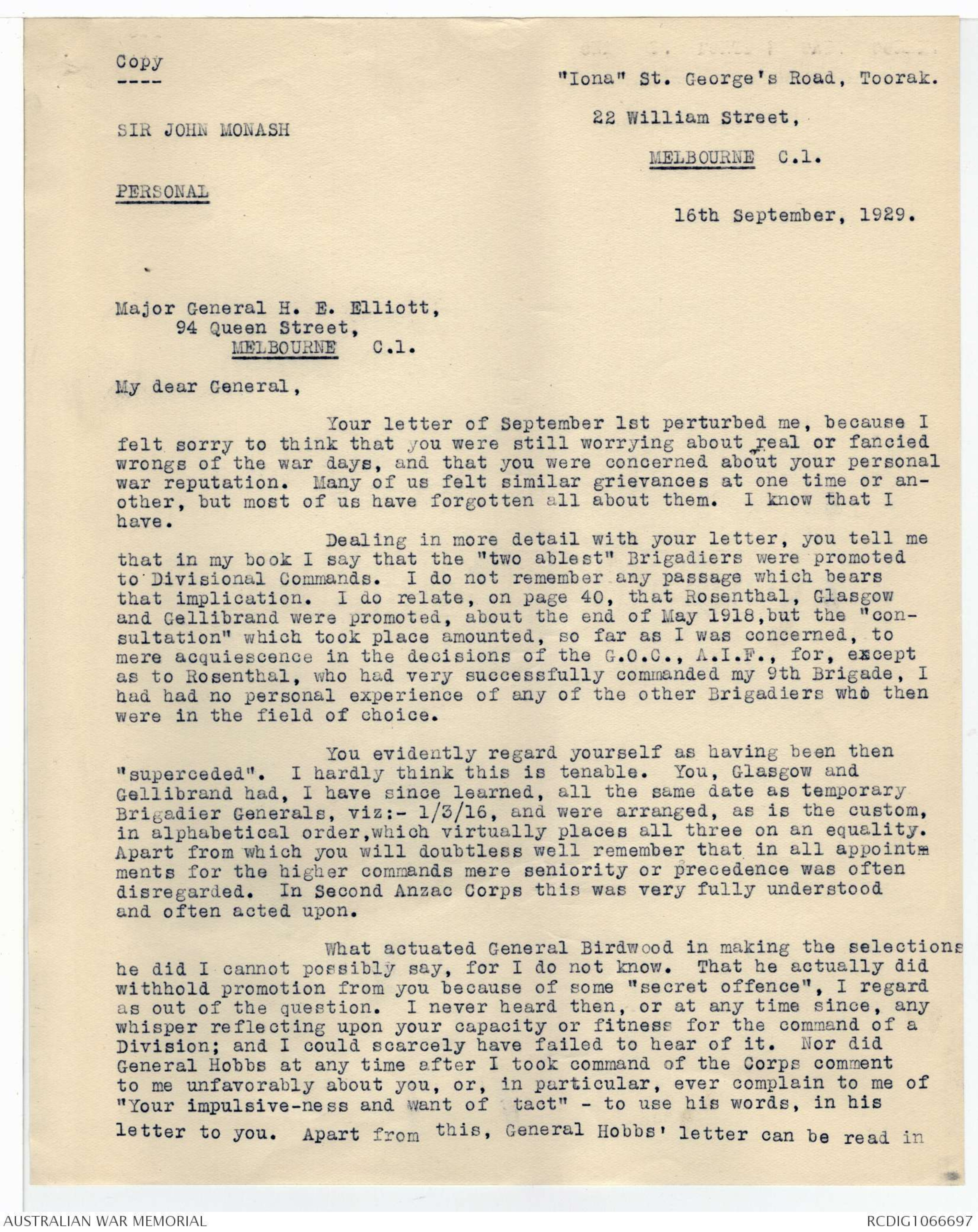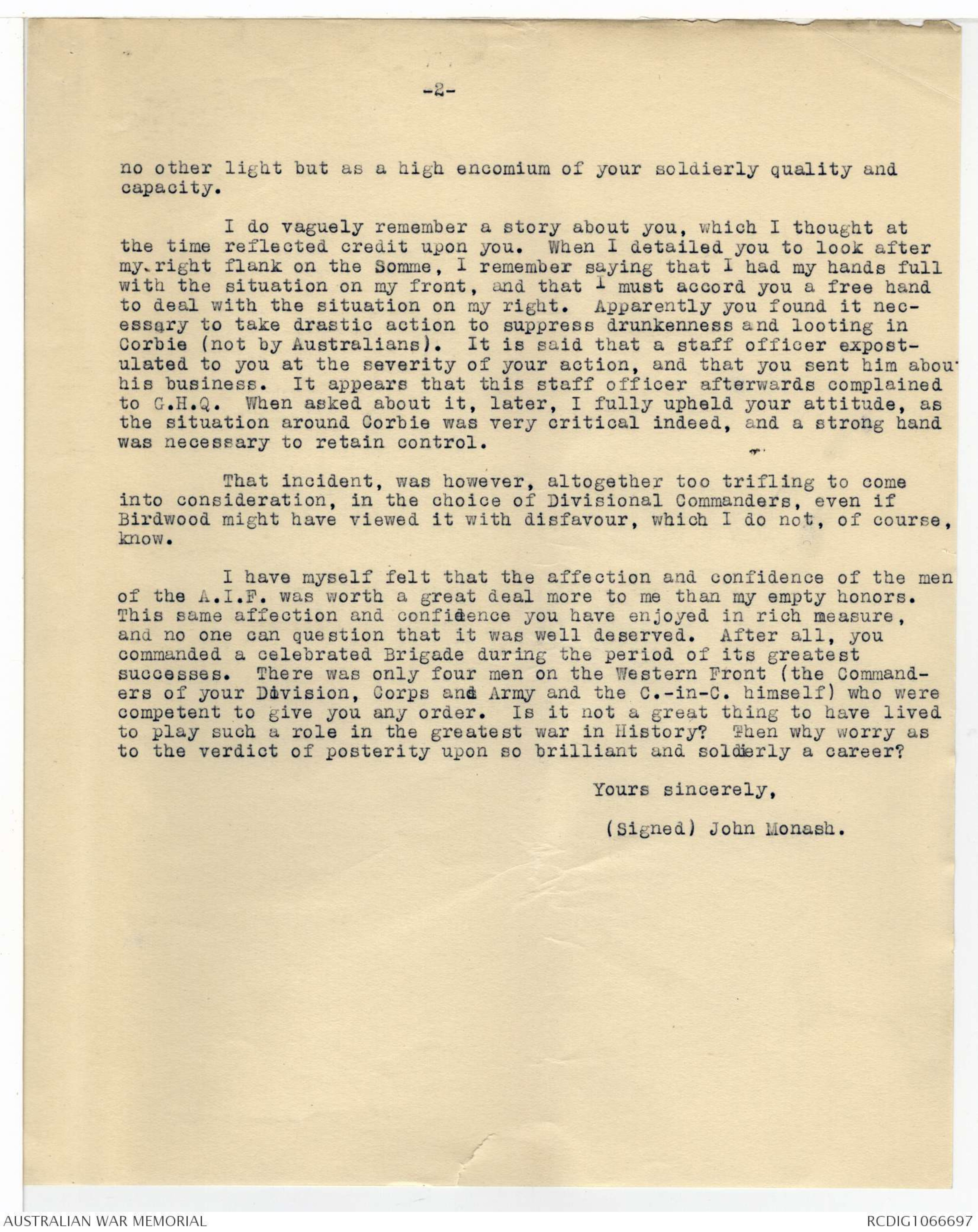Charles E W Bean, Diaries, AWM38 3DRL 606/261/1 - 1929 - 1930 - Part 17


Copy
"Iona" St. George's Road, Toorak.
22 William Street,
MELBOURNE C.1.
16th September, 1929.
SIR JOHN MONASH
PERSONAL
Major General H. E. Elliott,
94 Queen Street,
MELBOURNE C.1.
My dear General,
Your letter of September 1st perturbed me, because I
felt sorry to think that you were still worrying about real or fancied
wrongs of the war days, and that you were concerned about your personal
war reputation. Many of us felt similar grievances at one time or another,
but most of us have forgotten all about them. I know that I
have.
Dealing in more detail with your letter, you tell me
that in my book I say that the "two ablest" Brigadiers were promoted
to Divisional Commands. I do not remember any passage which bears
that implication. I do relate, on page 40, that Rosenthal, Glasgow
and Gellibrand were promoted, about the end of May 1918, but the "consultation"
which took place amounted, so far as I was concerned, to
mere acquiescence in the decisions of the G.O.C., A.I.F., for, except
as to Rosenthal, who had very successfully commanded my 9th Brigade, I
had had no personal experience of any of the other Brigadiers who then
were in the field of choice.
You evidently regard yourself as having been then
"superceded". I hardly think this is tenable. You, Glasgow and
Gellibrand had, I have since learned, all the same date as temporary
Brigadier Generals, viz:- 1/3/16, and were arranged, as is the custom,
in alphabetical order, which virtually places all three on an equality.
Apart from which you will doubtless well remember that in all appointments
for the higher commands mere seniority or precedence was often
disregarded. In Second Anzac Corps this was very fully understood
and often acted upon.
What actuated General Birdwood in making the selections
he did I cannot possibly say, for I do not know. That he actually did
withhold promotion from you because of some "secret offence", I regard
as out of the question. I never heard then, or at any time since, any
whisper reflecting upon your capacity or fitness for the command of a
Division; and I could scarcely have failed to hear of it. Nor did
General Hobbs at any time after I took command of the Corps comment
to me unfavorably about you, or, in particular, ever complain to me of
"Your impulsive-ness and want of tact" - to use his words, in his
letter to you. Apart from this, General Hobbs' letter can be read in
-2-
no other light but as a high encomium of your soldierly quality and
capacity.
I do vaguely remember a story about you, which I thought at
the time reflected credit upon you. When I detailed you to look after
my. right flank on the Somme, I remember saying that I had my hands full
with the situation on my front, and that I must accord you a free hand
to deal with the situation on my right. Apparently you found it necessary
to take drastic action to suppress drunkenness and looting in
Corbie (not by Australians). It is said that a staff officer expostulated to you at the severity of your action, and that you sent him about
his business. It appears that this staff officer afterwards complained
to G.H.Q. When asked about it, later, I fully upheld your attitude, as
the situation around Corbie was very critical indeed, and a strong hand
was necessary to retain control.
That incident, was however, altogether too trifling to come
into consideration, in the choice of Divisional Commanders, even if
Birdwood might have viewed it with disfavour, which I do not, of course,
know.
I have myself felt that the affection and confidence of the men
of the A.I.F. was worth a great deal more to me than my empty honors.
This same affection and confidence you have enjoyed in rich measure,
and no one can question that it was well deserved. After all, you
commanded a celebrated Brigade during the period of its greatest
successes. There was only four men on the Western Front (the Commanders
of your Division, Corps and Army and the C.-in-C. himself) who were
competent to give you any order. Is it not a great thing to have lived
to play such a role in the greatest war in History? Then why worry as
to the verdict of posterity upon so brilliant and soldierly a career?
Yours sincerely,
(Signed) John Monash.
 Sam scott
Sam scottThis transcription item is now locked to you for editing. To release the lock either Save your changes or Cancel.
This lock will be automatically released after 60 minutes of inactivity.